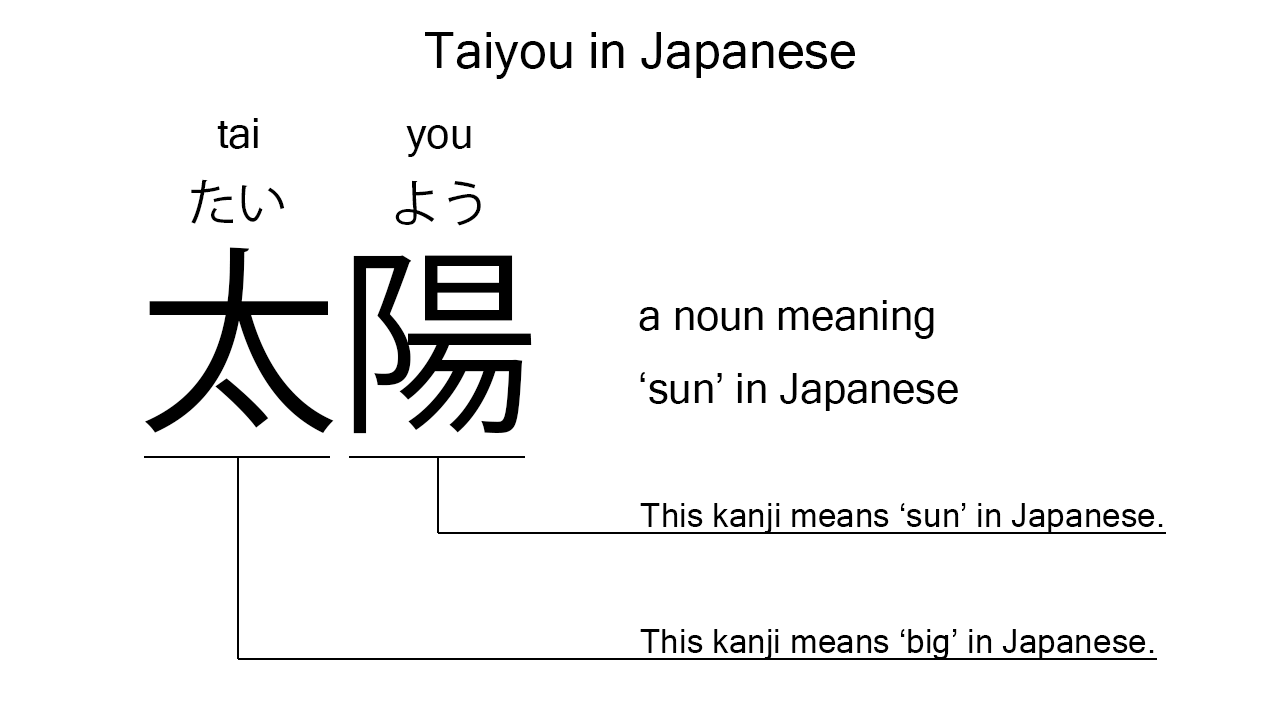What does “taiyou” mean in Japanese?
Native speakers say “taiyou” to mean ‘sun’ in Japanese. Perhaps, some Japanese learners know this word as it is sometimes used in Japanese movies, songs, novels, manga, anime, and the like. In this blog post, however, I will explain this word in detail based on its kanji expression. And also, I will explain how to use it through example sentences. My explanations would help Japanese learners understand “taiyou” more clearly. Then, let’s get started!
Contents
Definition and meaning of “taiyou”
Let me start with the definition and meaning of “taiyou”.
- taiyou – 太陽 (たいよう) : a noun meaning ‘sun’ in Japanese.
Japanese native speakers use this noun to refer to the star at the center of the solar system. So, this works in the same ways as the English noun, “sun”, I think.
The definition and meaning are very simple and clear. To understand this noun more clearly, however, let me explain its kanji characters in detail, one by one.
What does “taiyou” literally mean in Japanese?
The kanji expression of “taiyou” consists of the following two kanji characters:
- 太 : a kanji character used to mean ‘big’, ‘broad’, or ‘thick’ in Japanese. This can also be found in other words like “futoi“.
- 陽 : a kanji character used to mean ‘sun’ or ‘sunlight’ in Japanese.
These two kanji characters tell us that “taiyou” literally means ‘big sun’ in Japanese. This literal interpretation is not completely in line with the actual meaning, but still very close, I think.

When we meet new kanji expressions, we should check their kanji characters in detail to understand their meanings clearly and deeply. In many cases, kanji characters tell us a lot about the meanings of the expressions they form. Actually, here, we could get the better understanding of “taiyou” through the detailed kanji check above.
So far, I’ve explained the definition and meaning of “taiyou” together with its kanji characters. Then, let me explain how to use it through the example sentences below.
Example #1: how to say “sun” in Japanese
kyou wa taiyou ga mabushii desu – 今日は太陽が眩しいです (きょうはたいようがまぶしいです)
The sun is bright today.
Below are the new words used in the example sentence.
- kyou – 今日 (きょう) : a noun meaning ‘today’ in Japanese.
- wa – は : a binding particle working as a case marker or topic marker. In the example, this works as a topic marker after “kyou” to put a focus on it.
- ga – が : a case particle used to make the subject word or the object word in a sentence. In the example, this is used after “taiyou” to make the subject in the sentence.
- mabushii – 眩しい (まぶしい) : an i-adjective meaning ‘bright’ in Japanese.
- desu – です : an auxiliary verb used after a noun or adjective to make it polite. Probably, this is well known as a part of Japanese desu form. In the example, this is used after “mabushii” to make it sound polite.
This is a typical usage of “taiyou”. In this example, it works as a part of the phrase, “taiyou ga mabushii desu”, which politely means ‘the sun is bright’ in Japanese. Japanese people sometimes mention the sun or sunlight when they talk about the weather. So, this example sentence would be useful in conversations with them.
Example #2: another usage of “taiyou”
boku wa taiyou wa tairada to omoi masu – 僕は太陽は平らだと思います (ぼくはたいようはたいらだとおもいます)
I think that the sun is flat.
Below are the new words used in the example sentence.
- boku – 僕 (ぼく) : a pronoun meaning ‘I’ in Japanese. This is used mainly by boys and young males.
- wa – は : the same as explained in the last example. The first “wa” in this example works after “boku” to make the subject in the sentence; the second one works after “taiyou” to make the subject in the clause.
- tairada – 平らだ (たいらだ) : one conjugation of the na-adjective, “tairana”, which means ‘flat’ in Japanese.
- to – と : a case particle working as a quote marker. In the example, this works after the clause, “taiyou wa tairada”, to indicate what the speaker thinks.
- omoi – 思い (おもい) : one conjugation of the verb, “omou”, which means ‘to think’ in Japanese. In the example, it has been conjugated for the better connection with its following word.
- masu – ます : an auxiliary verb used after a verb to make it polite. Probably, this is well known as a part of Japanese masu form. In the example, this is used after “omoi” to make it sound polite.
This is another typical usage of “taiyou”. This noun is always a very good option when we want to say “the sun” in Japanese. Unfortunately, however, Japanese people rarely use this example sentence because they think that the sun is spherical in shape.
Summary
In this blog post, I’ve explained the definition and meaning of “taiyou” in detail based on its kanji expression. And also, I’ve explained how to use it through the example sentences. Let me summarize them as follows.
- taiyou – 太陽 (たいよう) : a noun meaning ‘sun’ in Japanese. Japanese native speakers use this noun to refer to the star at the center of the solar system. So, this works in the same ways as the English noun, “sun”, I think. These two kanji characters literally mean ‘big sun’ in Japanese. This literal interpretation is not completely in line with the actual meaning, but still very close, I think.
Hope my explanations are understandable and helpful for Japanese learners.